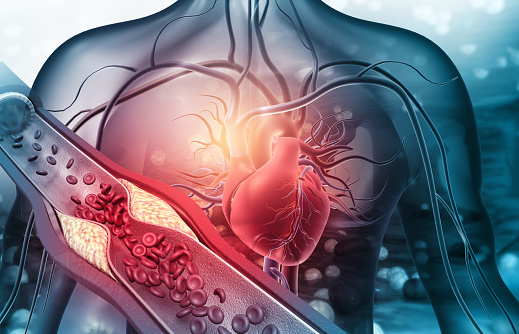Taking Care of your Heart and Circulatory Health During Winter Season

Your heart and circulatory system are complex organ systems. They provide the most important function in your body, pumping blood from your heart to all of your organs and tissues for oxygenation. But have you ever stopped to think about whether or not they're doing their job well? A lot of people don't realize that there's more than one way to improve these systems- here are some helpful tips on how you can keep them healthy!
The Human Heart and the Circulatory System
The heart is no simple organ. It's a fist-sized muscle that works continuously, beating 100,000 times or more per day to keep blood circulating through your body and provide oxygen and nutrients to all of your cells. As it beats, the heart contracts and relaxes in a process known as systole and diastole: when the left ventricle of the heart contracts (systole), it pumps oxygenated blood into your arteries; when it relaxes (diastole) blood flows back from your organs to get filled with fresh oxygen for another pump.
Every cardiac cycle uses about 1/5 of a litre of oxygenated blood or about 20% of your total supply. This means that the heart is responsible for exhausting 20% of all the oxygen in your body after each cycle. This in turn means that there is a strong correlation between optimal heart and cardiovascular health and overall well-being, both in terms of physical and mental health.
To deliver oxygen and nutrients to your tissues, the heart pumps about 2 litres of blood per minute (in a 70 kg person) through 60,000 km of arteries. The arteries divide into smaller and smaller branches as they carry blood to more and more tiny capillaries; pumping pressure is lowest at this level (about 0.8 mmHg) and delivers nutrients to every cell.
What Happens to the Heart and the Circulatory System During Winter Season?
Low temperature does affect the cardiovascular system, though there are some seasonal changes in circulation that do not have adverse effects on overall health. However, weather condition makes our bodies work harder so as to maintain their temperature which means more stress on your heart. Also, remember that cold air contains less oxygen than warm air so you need to breathe heavily so as to deliver oxygen to your cells – this makes the blood pressure rise.
In addition to these changes, blood vessels also constrict because of the cold which means less blood flow through these vessels. This happens especially in the hands and feet as they are farther from the heart.
How to Maintain a Healthy Heart and Circulatory System?
A healthy heart is more than just a cliché. It's also the key to living a long, active life. But what does it mean to have a healthy heart? Here are some tips from the experts that you can add to your health routine to keep your heart and cardiovascular system on a fabulously healthy course.
1. Exercise for at least 30 minutes a day
According to the Centers for Disease Control and Prevention, adults should aim to exercise at least 30 minutes of moderate-intensity activity on most days of the week. You can break up your time into 10-minute chunks if that helps you get started.
2. Don't sit all day long.
This will put additional strain on your heart as well as increase your risk of obesity, diabetes and certain types of cancer (endometrial included). Even if you must work a sedentary job, try taking breaks throughout the day to walk or move around.
3. Eat more fruits and vegetables
Eat plenty of fruits and vegetables every day which are low in calories but high in vitamins and minerals essential for cardiovascular health such as beta carotene, potassium, vitamin C etc.
According to the heart foundation, adults should eat two serves of fruit and five veggies every day.
4. The benefits of fish oil
Studies have shown that consuming 1-2 grams per day (1000mg or 2000mg) can help reduce triglycerides (fatty substances in the blood), prevent blood clots, reduce chances of abnormal heart rhythms and lower high blood pressure. Aim to get at least 1 gram per day through your food intake by including 2-3 servings of oily fish like salmon, mackerel or herring each week or through supplements. You might want to ask your doctor for advice before taking them though because they can interact with medications like anticoagulants (blood thinners) etc.
5. Drink plenty of water
When you are in cold environments, your body will produce more mucus to protect the respiratory tract against inhaled viruses and bacteria. This increased production of mucus is one of the main reasons for feeling congested. Drink 2 litres of water daily to help thin this excessive mucus.
6. Don't forget about herbal tea!
Tea contains compounds that trigger thermogenesis (production of heat by burning calories) by activating brown fat cells via norepinephrine release - which increases metabolism and helps burn off extra calories.
A study found that green tea was particularly effective because it contains caffeine, polyphenols and low levels of tannin, allowing for an enhanced energy boost while helping to reduce fatigue at the same time.
7. Reduce your salt intake
During the colder months, you tend to feel hungrier because your body's leptin levels drop down. This hormone triggers satiety and you will start eating more. But make sure to avoid an increased sodium intake, as it causes you to retain water, which makes you feel bloated. Also, try cooking at home - fries or packaged foods are loaded with salt.
High salt intake is not good for your heart health. It causes the body to lose potassium and also elevates blood pressure, increasing the risk of stroke and heart attack.
8. Monitor your blood pressure
If you have high blood pressure, now is a great time to monitor it regularly. If you suffer from hypertension, now is a good time to cut down on salt as well as sugar intake - both can increase blood pressure even more during the winter months. Your doctor will be able to prescribe you medications that lower blood pressure to a healthy level if needed.
9. Quit smoking or chewing tobacco
Did you know that smoking or chewing tobacco can cause your blood pressure to increase during the winter months? Yes, it does. How?
Smoking or chewing tobacco can cause stress to your heart which increases blood pressure. Nicotine, a chemical found in tobacco, constricts the blood vessels of the body thus increasing pressure on your heart. How can you quit? A nicotine patch or nicotine gum works best for smokers. Visit your doctor if you need help quitting this habit.
10. Don't skip breakfast
Breakfast is important! It provides energy that helps keep our heart healthy. Studies have found that people who skip breakfast have a higher fat content in their blood which increases the risk of developing heart disease.
11. Get plenty of sleep
Did you know that lack of sleep can cause high blood pressure? According to studies, not getting enough rest can increase high blood pressure by up to 10%! So sleep early every night so your body gets enough rest before starting another day!
12. Stay away from spicy foods
Hot and spicy foods are loved during winter. What people do not realize is the fact that they can affect your blood pressure too by increasing it significantly.
Spicy foods contain a chemical called capsaicin, which is known to increase your heart rate and blood pressure. So limit the amount of spicy food you eat!
13. Keep away from stress as much as possible
Stress has always been a factor for various health problems such as heart disease, hypertension and diabetes. When you are stressed, your hormones and neurotransmitters trigger the release of cortisol and norepinephrine. These chemicals cause your blood vessels to constrict, resulting in an increase in blood pressure. In order to avoid these side-effects of stress, try as much as possible to relax!
14. Keep a close eye on your habits
If you've been following healthy habits, stick to them even in the wintertime. Make sure that you are eating healthy too, don't let winter get in the way of your diet. If you had been following a high-fibre diet, make sure to continue it since fibre helps prevent heart disease by reducing cholesterol levels. If you don't drink a lot of caffeinated beverages in general then avoid consuming them in the wintertime.
15. Check out your blood pressure
If your blood pressure is higher than normal, make an appointment with your medical professional right away!
High blood pressure can lead to stroke or heart attacks if not checked immediately. Make sure to keep monitoring its levels before any life-threatening medical conditions appear.
16. Take multivitamins
Get some multivitamins to make sure that you won't get sick during winter. This is especially important if you live in areas where the cold season lasts for a while (such as Canada). If you can, try taking vitamin D since it improves bone health and the immune system.
17. Don't skip meals
Don't forget to eat! Skipping meals is not a good idea for a healthy lifestyle, especially during winter. If you feel hungry, make sure to eat a healthy snack or meal that includes some protein and whole grains.
18. Practice good hygiene
Make sure to wash your hands properly if you want to avoid getting sick. Wash your hands with soap and water before entering the house, after gardening, sneezing or coughing, after touching public items (elevator buttons, doorknobs) and after eating.
Microorganisms such as bacteria, viruses and fungi live on our hands and other surfaces. If we don't wash them off properly, they can easily get into our bodies through cuts or be swallowed by simply breathing in the air. Once the microorganisms enter your body, there's no telling what can happen, but it may lead to infections.
19. Use a humidifier
This is especially beneficial for people with dry skin or respiratory problems such as asthma and allergies. However, if you are using a humidifier, make sure that your bedroom is not too moist or too damp because moisture promotes the growth of bacteria and fungi, which could irritate your respiratory system instead of helping you breathe better.
20. Prepare yourself for the cold weather
Make sure to keep your home warm before going outside. Dress properly for going outdoors as well since temperatures might be unexpected sometimes.
Your heart and circulatory system are always working for you, but during the winter season, they may need a little more care. Check out these tips to help your body stay strong through the cold months ahead!
Heart Attack During Winter, is it possible?
There's a misconception that heart attacks only happen during the summertime. In reality, they can happen at any time of year. And in some cases, winter may be when they are more likely to occur. Here's what you need to know about heart attacks during the colder months.
Why are the winter months to watch out for?
Winter is full of different types of dangers for your heart, including subzero weather, increased stress levels and even holiday binge drinking. While it might be fun to throw on a tank top and head outside with friends during the summertime, putting yourself in similar situations can put you at risk for a heart attack. What's more, is that the winter months have the highest number of heart attacks.
Exactly why is this?
As temperatures drop, our bodies adjust by constricting or narrowing blood vessels near the skin surface in order to retain heat. However, since these same blood vessels are responsible for bringing essential nutrients to your muscles and organs, they are also constricted (narrowed) in areas where they are needed most such as your heart. As a result, blood flow is disrupted and can pool in areas that normally wouldn't contain it. This can cause the vessels to become blocked and ultimately lead to a heart attack.
However, you can protect yourself from this by wearing layers! Wearing multiple thin layers of clothing will help maintain body heat and prevent constricting blood vessels.
On top of protecting yourself from the winter cold, be sure to also take care of yourself by eating healthy foods filled with essential vitamins and minerals. Foods like blueberries, berries, leafy greens, citrus fruits, carrots, cantaloupe, walnuts, almonds, cabbage, watermelon, broccoli, sweet potatoes, oatmeal are all good options. If you do not like to eat these foods, you can take multivitamins like Applied Science Nutrition's specially formulated ASN Over 40 Multi-Vitamins.
Look no further than our amazing product! Our multi-vitamin contains all the essential vitamins and minerals your body needs to support heart, eye, and immune health. Plus, it's specially formulated to meet the unique needs of those over 40. So don't wait any longer - order your multi-vitamin today!
You can also check our products that aim to support a healthy heart and circulatory system:
Total Blood Support

Total Blood Support is an all-natural supplement that helps to optimize your body's endothelium function - which is your body's natural blood pressure support system. This product is made for men and women looking for a long-term, safe and effective way to maintain healthy blood pressure levels. With Total Blood Support, you can also enjoy ongoing cardiovascular support, increased energy and overall well-being.
Applied Science Nutrition's Omega-3

Applied Science Nutrition's Omega-3 is a great way to make sure you're getting the fatty acids you need for good health. This high-quality omega 3 supplement comes from wild-caught fish and other plant sources, and it contains a balance of EPA, DHA, and DPA. It's an essential nutrient that can help prevent heart disease, manage weight, boost brain health, and more. So don't miss out - pick up a bottle of Applied Science Nutrition's Omega-3 today!
You can read more on maintaining your heart health in our article How to Keep Your Heart Healthy. This article includes basics on heart health including the anatomy of the cardiovascular system so you can get familiar with this special organ system. You can also learn more about how the heart, valves, and blood vessels work to keep you alive and moving.
Take Care of your Heart and Circulatory Health During Winter Season
As we get older, the body and mind need to be cared for in order to stay healthy. A doctor's advice is always best but a few changes can make your life better too!
To learn more about ASN products, visit our product page. To speak to a representative, call +1 (833) 991-2876 (BURN) or email us at support@appliedsciencenutrition.com. Our customer support representatives are available to assist you every day at any time. In order to get the best customer service and product recommendations, we recommend you reach out to us!
Applied Science Nutrition wants nothing more than for you to be healthy and happy, which is why they provide products that will help optimize your internal health so you can thrive every day!
REMINDER! PLEASE TAKE TIME TO READ!
This article on caring for your heart and circulatory health including all of the texts, images, and links were shared for informational purposes only. It is not intended to be a substitute for a medical expert's evaluation, advice, or treatment. To properly integrate and manage your overall health care, talk with your family doctor about any changes you want to make.
If your symptoms or signs worsen, talk with your doctor. Contact your care provider if you have any concerns about worsening symptoms or indications. As soon as possible, go to the nearest emergency department or call 911 in the case of a medical emergency.
Applied Science Nutrition does not recommend or suggest any particular physicians, tests, procedures, opinions, or other related information that may be found on this website. This article and the site's pages are for your personal use only and at your own risk. Furthermore, our firm is not responsible and will not be held liable for any of the claims made on external website links linked in the article.









